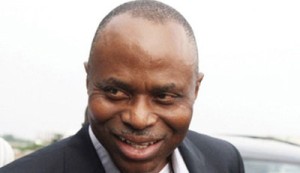Ondo Bows to Pressure, Suspends Monarch

Last August, his people rose up in arms against him to demonstrate that power, be it political or monarchical, truly derives from the people. They chased him out of the community after what they considered as “overflowing sins” of a traditional ruler. Oba Pius Akinfesola, the Akamuja of Igburowo in Odigbo Local Government Area of Ondo State, then left the community with his family believing that with time, the anger of the people would simmer and he would return to the throne. But that does not seem likely, as the Ondo State Government has approved his suspension from office until further notice.
The suspension was contained in a letter dated February 7, 2013 and signed by the Permanent Secretary, Ondo State Ministry of Local Government and Chieftaincy Affairs, Mr. A.O Adeola
THISDAY learnt that the suspension of the monarch was sequel to a letter of protest written by the people of the community to the Ondo State Government requesting the official deposition of the traditional ruler.
The community in their letter of protest had levelled sundry allegations against the monarch.
The letter asked the embattled monarch to stop parading himself as the traditional ruler of the community pending the determination of the allegations against him.
The letter, titled: “Demand for Official Deposition of Oba Pius Akinfesola Adewola as Akamuja of Igboruwo”, reads: “I am directed to refer your attention to the above subject as captioned in a letter written by Igburowo community to the Executive Governor of Ondo State and to inform you that following thoughtful consideration of the various allegations levelled against you, the state government has resolved to set up a panel of enquiry with a view to dispassionately arbitrate in the matter.
“In the interim, you have been suspended with immediate effect, you are therefore requested to stay away from office and stop parading yourself henceforth as the Akamuja of Igburowo land until the report of the panel is received. This is to ensure proper administration of justice and to prevent a breakdown of law and order in the community.”
Adewola’s trouble started with a peaceful demonstration by the community on August 26, 2012 during which the monarch was chased out of his palace over an allegation that he brought negative image to the community because of alleged atrocities he had committed.
During the protest, Adewola was unceremoniously banished from his palace and made to trek several kilometres from the palace until he was rescued by policemen who were drafted to maintain law and order by the Divisional Police Officer (DPO) in charge of the Ore Divisional Police Station, Mr. Adekimi Ojo, a Chief Superintendent of Police (CSP).
Prior to his banishment, the people had in a letter dated August 3, 2012, protested the alleged atrocities of the monarch. The letter was signed by no fewer than 21 representatives of the community, including the high chiefs, women chiefs otherwise called Opoji in local parlance as well as male and female indigenes, members of Igburowo Development Committee (IDC), youth association and the secretary of Akinbumiti Ruling House.
In the letter, addressed to the state Governor, Dr. Olusegun Mimiko, the people said that their action was predicated on the need to save the name of the community from disrepute. The state Commissioner for Local Government and Chieftaincy Affairs as well as the Attorney General and Commissioner for Justice were copied.
The people accused the monarch of perpetrating various atrocities in the community such as fraud, acquisition of land belonging to his subjects, frivolous litigation over subject’s property, non-performance of traditional rites and assaulting his chiefs and subjects.
The embattled monarch was also accused of running an autocratic administration by refusing to constitute the Oba-in-Council in the community several years after the death of some other high chiefs called Iwarefas in local parlance who traditionally are required to run the township administration with him.
In addition, Adewola was also accused of refusing to conduct traditional meetings at the designated place, popularly referred to as Ugha in local parlance, where people gather to discuss matters affecting the community.
The petitioners had also detailed how, on one occasion, the monarch engaged in a brawl with one of his chiefs, just as he was similarly accused of unauthorised conversion of the community resources to personal use and writing of fictitious petitions and institution of several court cases against his subjects.
The monarch, who was said to have confirmed the receipt of the letter of his suspension, however, said that he had made all necessary arrangements to challenge the circumstances that led to his banishment from the community in court.






















Leave a Reply